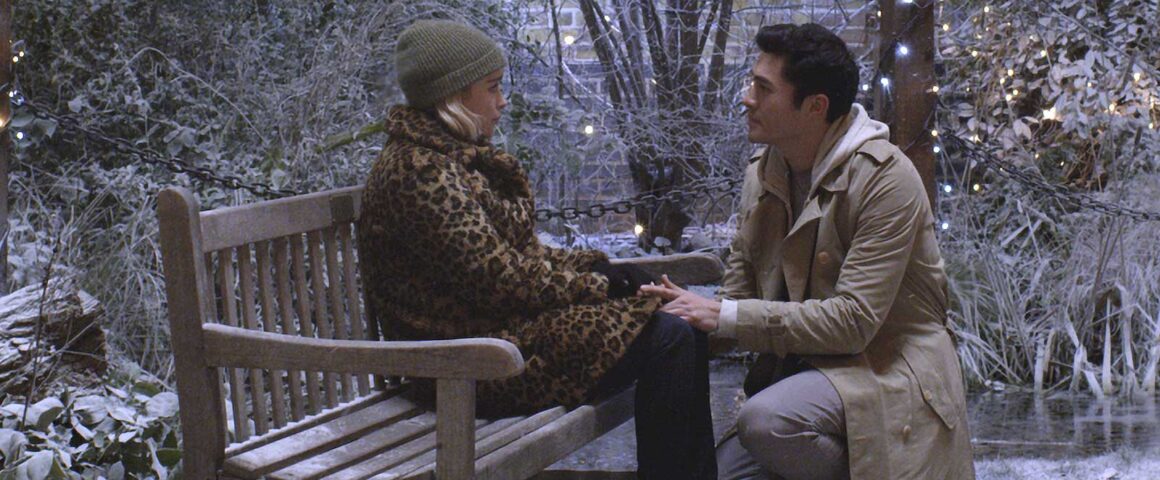Ah, Christmas. A time of Hallmark cinematic splendor, candy canes, and Bath and Body Works candles, it truly can be (to some) the most wonderful time of the year. But what does Hollywood have to offer? Well, with cheaper competition from Netflix and Hallmark, there aren’t as many Christmas-themed gifts put under the movie theater tree. But Tinseltown isn’t giving up without a fight. Their first offering? Universal’s Last Christmas, directed by Paul Feig (“Ghostbusters”) starring Emilia Clarke (“Solo: A Star Wars Story”), Henry Golding (“Crazy Rich Asians”), and Emma Thompson (“The Meyerowitz Stories”) who also gets a screenwriter credit here.
Surrounded by the music of George Michael, the film (adapted from the Wham! song of the same name) tells the story of Katarina, aka “Kate” (Clarke), a down-on-her-luck heroine that has recently dealt with a significant health scare. When she isn’t drinking her dilemmas away or shifting from one friend’s apartment to the next, Kate works in a yearly-run Christmas shop, dressed in Elf-themed glamour from head-to-toe. One day, she bumps into Tom (Golding), a man who is as charming as he is mysterious. Coming in and out of Kate’s life, Tom serves as a light at the end of her dismal tunnel. Will this heroine turn her life around? Will merriment and love triumph over all? And how does Brexit fit into all of this? That’s what Paul Feig and company try to answer within the film’s 1-hour and 42-minute running time.
When looking at the cornucopia of Christmas media in the world, it is quite evident that a majority of what exists is not meant to please those in search of Terrence Malick’s next project. Instead, most flicks that showcase the holidays are meant to celebrate an aesthetic — simultaneously emotional and visual, and Last Christmas does that in all its holly jolly glory. The London setting is as fairy tale as they come, Kate’s “grungey” attire is “Miracle on 34th Street” meets Madewell, and Tom’s flat looks like it came straight out of a Pottery Barn catalog. All of it is comfy, warm, and inviting — as Christmas should always be.
Similarly comfortable is the soundtrack, which showcases the extensive collection of George Michael’s melodic delights. From the Wham! era classics to the solo chart-toppers, every song you’ve loved from the iconic pop star is given a moment to shine. But after a few montage sequences, the question begs to be asked — what do these songs (aside from the title one) have to do with the film’s narrative? If they’re so crucial to Kate’s story, why couldn’t this have been a lite-jukebox musical ala this year’s “I Saw The Light”? That is an answer we may never receive but will ponder the minds of many of those craving for Michael’s music to get the theatrical treatment.
Instead, Last Christmas is a whimsical examination of love in its many forms. Whether it be the kind between a couple, a mother and daughter, or the internal kind that many are always searching for, the film covers every angle of the topic. Yet what is smushed between this sentimental drive towards the narrative finish line is a lot of muddled bullet points. From mentions of the struggles of immigrants to the political tensions within the United Kingdom, Emma Thompson and Bryony Kimmings’ script sometimes comes off more like a teenage angst-filled Tumblr post during the holidays.
But perhaps the most unfortunate disappointment within the narrative is its lack of establishing any “rules.” If you’re at all the sort of person that picks up on things in trailers, then you might have gained that this film has a twist. Of course, no spoilers here, but the way that the world-building moves towards making the fantastical appear “fairy tale” logical is sloppily forgotten throughout the story — causing the ultimate ending to leave viewers perhaps more unsettled than satisfied.
Yet, even with the setbacks, what makes the script sparkle is when all of the film’s talent comes together. Emilia Clarke, for starts, is lining herself to be England’s modern-day answer to Meg Ryan. Because as much as her Kate can make decisions that may leave you wanting to scream, it is hard not to love her girl next door charms. Golding pulls a similar magic trick, using some classic movie swagger that makes it difficult to not fall under his spell. But the real surprise here is Michelle Yeoh (“Morgan”) as Kate’s boss, Santa. Armed with a cannon full of sass and effortless timing, Yeoh is a force that balances her sharp comebacks with looks that’ll be referenced for decades to come.
Though the real magician here is Paul Feig — a director who is often not celebrated enough for his legitimate successes. Perhaps he doesn’t make the kind of films that play festival circuits, or the ones that change the landscape of filmmaking forever. But what he does create are stories about interesting, flawed heroines — the kind that, though they can be in cartoonish situations, are relatable in their strange way. And in a history of romantic Christmas flicks that often don’t show truly imperfect, authentic female protagonists, it’s nice to see Kate more like a Mary from “It’s a Wonderful Life” than a Hallmark movie standee.
Overall, Last Christmas has that sweet, humble bit of sparkle that’ll make it sit right on the shelf with many other Christmas classics. Perhaps the script tries to pack too many ideas into its narrative, along with a few details that don’t connect in the neatest of ways. Still, in a tinsel-decorated landscape that includes silly films like “Love Actually” and “The Holiday,” Last Christmas is just continuing on a tradition of cinematic fluff that is as harmless as leaving an extra cookie for Santa on Christmas Eve. It is a decision that doesn’t take much effort and is ultimately rewarding for you (wink) and the big red-wearing guy too.



